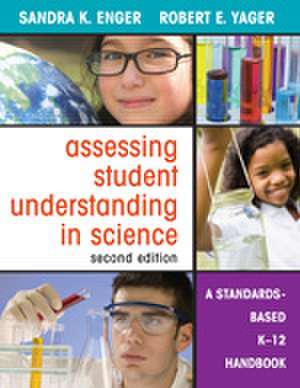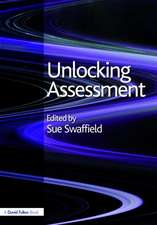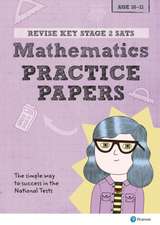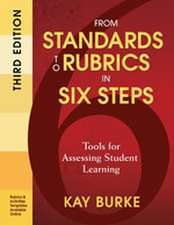Assessing Student Understanding in Science: A Standards-Based K-12 Handbook
Autor Sandra K. Enger, Robert E. Yageren Limba Engleză Paperback – 2 noi 2009
| Toate formatele și edițiile | Preț | Express |
|---|---|---|
| Paperback (1) | 310.63 lei 6-8 săpt. | |
| SAGE Publications – 2 noi 2009 | 310.63 lei 6-8 săpt. | |
| Hardback (1) | 559.50 lei 6-8 săpt. | |
| SAGE Publications – 21 dec 2009 | 559.50 lei 6-8 săpt. |
Preț: 310.63 lei
Nou
Puncte Express: 466
Preț estimativ în valută:
59.48€ • 61.36$ • 49.30£
59.48€ • 61.36$ • 49.30£
Carte tipărită la comandă
Livrare economică 20 februarie-06 martie
Preluare comenzi: 021 569.72.76
Specificații
ISBN-13: 9781412969932
ISBN-10: 141296993X
Pagini: 216
Dimensiuni: 216 x 279 x 13 mm
Greutate: 0.6 kg
Ediția:Second Edition
Editura: SAGE Publications
Colecția Corwin
Locul publicării:Thousand Oaks, United States
ISBN-10: 141296993X
Pagini: 216
Dimensiuni: 216 x 279 x 13 mm
Greutate: 0.6 kg
Ediția:Second Edition
Editura: SAGE Publications
Colecția Corwin
Locul publicării:Thousand Oaks, United States
Recenzii
“In this second edition, Enger and Yager expand their previous work by suggesting new assessments and more clearly connecting their assessments with the National Science Education Standards. For classroom teachers, this book offers a range of suggestions that can enhance classroom instruction. For science teacher educators, this book is an invaluable and handy resource in working with beginning, new, or experienced science teachers.”
"This valuable contribution to the field offers clear explanations and examples of different types of assessments and suggests very practical applications for teachers of all levels. The authors present some wonderfully creative approaches to assessment, going beyond the usual methods."
"The material enables readers to self-assess on many levels: their own understanding of assessment in general, how assessment looks within the science content, and the many different applications. The coverage appeals to science teachers at all levels and all disciplines."
"Does an exceptional job of addressing the most controversial and misunderstood aspect of delivering quality science instruction. The six domains of quality science teaching are addressed with examples of what is included in each. The book clearly describes various types of assessments, with the advantages and disadvantages of each. It also provides numerous references on asessing students in science."
“Drawing on the latest research, best practices, and the wisdom of practitioners from all levels of the education spectrum, this powerful, comprehensive document pinpoints and prioritizes our work to ensure a foundation for all classroom applications of assessments. This is an invaluable resource for educators, K-12."
"This text offers information regarding the theory and real-world applications of a variety of assessments that can be used to address the unique standards of science education. The text addresses the need to assess all six domains of science literacy and offers tried-and-true methods and instruments that can be used to assess each domain. It does so by providing definitions of each domain and offering specific suggestions as to how the results can be used across the range of levels in our schools. The text is a wonderful collection of science-specific assessment information that can be used by those of us interested in assessing students and conducting research in K-12 science education."
"This valuable contribution to the field offers clear explanations and examples of different types of assessments and suggests very practical applications for teachers of all levels. The authors present some wonderfully creative approaches to assessment, going beyond the usual methods."
"The material enables readers to self-assess on many levels: their own understanding of assessment in general, how assessment looks within the science content, and the many different applications. The coverage appeals to science teachers at all levels and all disciplines."
"Does an exceptional job of addressing the most controversial and misunderstood aspect of delivering quality science instruction. The six domains of quality science teaching are addressed with examples of what is included in each. The book clearly describes various types of assessments, with the advantages and disadvantages of each. It also provides numerous references on asessing students in science."
“Drawing on the latest research, best practices, and the wisdom of practitioners from all levels of the education spectrum, this powerful, comprehensive document pinpoints and prioritizes our work to ensure a foundation for all classroom applications of assessments. This is an invaluable resource for educators, K-12."
"This text offers information regarding the theory and real-world applications of a variety of assessments that can be used to address the unique standards of science education. The text addresses the need to assess all six domains of science literacy and offers tried-and-true methods and instruments that can be used to assess each domain. It does so by providing definitions of each domain and offering specific suggestions as to how the results can be used across the range of levels in our schools. The text is a wonderful collection of science-specific assessment information that can be used by those of us interested in assessing students and conducting research in K-12 science education."
Cuprins
Preface
Acknowledgments
About the Authors
1. A Framework for Assessing Student Understanding in Science
Assessment Based on Six Domains of Science
I. Conceptual Domain
II. Process Domain
III. Application Domain
IV. Attitude Domain
V. Creativity Domain
VI. Nature of Science Domain
Assessment Approaches Aligned With the Six Domains
2. Assessment in the Contexts of Teaching
Planning Instruction and Assessment
What Assessment Is
Formative and Summative Assessment
Assessment Types and Approaches
National Science Education Assessment Standards
Implementing Assessment Guidelines
The Internet as an Assessment Resource
3. Evaluating Teaching Practice
Action Research
Assessment of Classroom Practice With Video Recording Support
Sources of Instrumentation for Assessing Practice
Self-Assessment of Constructivist Practice
Science-as-Inquiry Surveys
4. Rubrics and Scoring Guides
Rubrics and Scoring Guides: What Are They?
Rubric Construction: A Teacher's Perspective
Rubric or Scoring Guide Design
Examples of Tasks and Rubrics
How Well Does a Rubric Communicate the Original Task?
5. Science Notebooks
Science Notebooks: Formative and Summative Assessment Tools
Notebook Scaffolds
Assessment Components for Notebooks
Supporting Graphing Skills and Abilities
6. Assessment Examples for All Grade Levels
Open-Ended Questions (Integrates Domains)
Student Laboratory Environment Inventory (Integrates Domains)
Ideas for Assessing in the Application Domain
Observation Checklist (Integrates Domains)
Use of Application-Level Multiple-Choice Questions
Examples for the Creativity Domain
Assessing Attitudes, Preferences, and Processes
7. Assessment Examples for Grades K Through 4
Applying Process Skills and Experimental Design
Application Assessment Items for Grades K Through 3
Assessing Attitudes About Science
Student Self-Assessment
Assessing Perceptions About Scientists
8. Assessment Examples for Grades 5 Through 8
Developing a Group Performance Task
Preparation for Standardized Tests
Electronic Portfolios for Students
Structuring Peer Assessment for Cooperative Groups
Class Assessment of Group Project Presentations
9. Assessment Examples for Grades 9 Through 12
Using the Student Laboratory Environment Inventory
Looking at Science Processes
Assessing Specific Areas of Understanding
Assessing Students' Views of the Scientific Process
Glossary of Assessment-Related Terminology
References
Index
Acknowledgments
About the Authors
1. A Framework for Assessing Student Understanding in Science
Assessment Based on Six Domains of Science
I. Conceptual Domain
II. Process Domain
III. Application Domain
IV. Attitude Domain
V. Creativity Domain
VI. Nature of Science Domain
Assessment Approaches Aligned With the Six Domains
2. Assessment in the Contexts of Teaching
Planning Instruction and Assessment
What Assessment Is
Formative and Summative Assessment
Assessment Types and Approaches
National Science Education Assessment Standards
Implementing Assessment Guidelines
The Internet as an Assessment Resource
3. Evaluating Teaching Practice
Action Research
Assessment of Classroom Practice With Video Recording Support
Sources of Instrumentation for Assessing Practice
Self-Assessment of Constructivist Practice
Science-as-Inquiry Surveys
4. Rubrics and Scoring Guides
Rubrics and Scoring Guides: What Are They?
Rubric Construction: A Teacher's Perspective
Rubric or Scoring Guide Design
Examples of Tasks and Rubrics
How Well Does a Rubric Communicate the Original Task?
5. Science Notebooks
Science Notebooks: Formative and Summative Assessment Tools
Notebook Scaffolds
Assessment Components for Notebooks
Supporting Graphing Skills and Abilities
6. Assessment Examples for All Grade Levels
Open-Ended Questions (Integrates Domains)
Student Laboratory Environment Inventory (Integrates Domains)
Ideas for Assessing in the Application Domain
Observation Checklist (Integrates Domains)
Use of Application-Level Multiple-Choice Questions
Examples for the Creativity Domain
Assessing Attitudes, Preferences, and Processes
7. Assessment Examples for Grades K Through 4
Applying Process Skills and Experimental Design
Application Assessment Items for Grades K Through 3
Assessing Attitudes About Science
Student Self-Assessment
Assessing Perceptions About Scientists
8. Assessment Examples for Grades 5 Through 8
Developing a Group Performance Task
Preparation for Standardized Tests
Electronic Portfolios for Students
Structuring Peer Assessment for Cooperative Groups
Class Assessment of Group Project Presentations
9. Assessment Examples for Grades 9 Through 12
Using the Student Laboratory Environment Inventory
Looking at Science Processes
Assessing Specific Areas of Understanding
Assessing Students' Views of the Scientific Process
Glossary of Assessment-Related Terminology
References
Index
Notă biografică
Sandra K. Enger is a faculty member at The University of Alabama in Huntsville (UAH) and associate director of the Institute for Science Education. She teaches methods courses for preservice teachers in elementary science and also undergraduate and graduate assessment courses. As a professional development provider, she has worked with international teachers from Russia, the Ukraine, and multiple Trans-Eurasian countries. Her consulting work includes development of assessment materials, conducting project evaluations, and participation in alignment studies. She graduated from Winona State (MN) University with a BS in science and a master¿s degree in biological sciences. Her PhD in science education was awarded by The University of Iowa. She has had extensive classroom experience at both secondary and university levels.
Descriere
Provides extensive standards-based examples for assessing science teaching and learning, including the use of portfolios, formative assessments, student self-evaluations, rubrics, and science notebooks.












